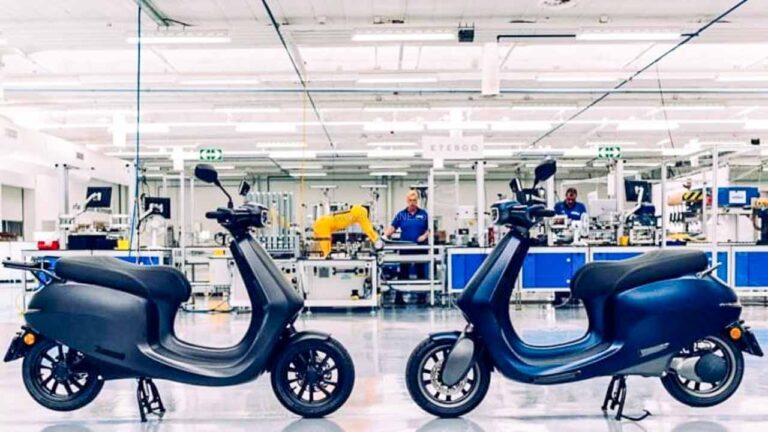Six months after it acquired the Dutch start-up Etergo and weeks after appointing General Motors veteran Jose Pinheiro as the head of its electric vehicle (EV) business, India’s homegrown ride-hailing company has finally made its expected big-bang announcement.
On Monday Ola announced that its EV subsidiary Ola Electric will invest $326 million to set up, what it calls, the ‘world’s largest’ electric scooter (e-scooter) manufacturing plant in Hosur, in the Indian state of Tamil Nadu.
The SoftBank-backed Ola aims to make India a manufacturing hub for EVs, which upon completion will create almost 10,000 jobs with an annual capacity of 2 million e-scooters.
“We are excited to announce our plans to set up the world’s largest scooter factory,” Bhavish Aggarwal, the chairman and group CEO of Ola, said.
“This is a significant milestone for Ola and a proud moment for our country as we rapidly progress towards realising our vision of moving the world to sustainable mobility solutions across shared and owned mobility.”
Ola claims to be India’s largest mobility platform and one of the world’s largest ride-hailing companies, serving countries such as India, Australia, New Zealand, and the UK, with key global cities like London and Sydney.
“This will be one of the most advanced manufacturing facilities in the world. This factory will showcase India’s skill and talent to produce world class products that will cater to global markets,” Aggarwal said.
The proposed EV factory will cater to customers not only in India but in markets around the world including Europe, Asia, Latin America, and more, the company said.
Electrification drive
The Indian government has been pushing automakers to move to cleaner fuel technology, especially electric, in an effort to reduce its oil import bill and curb pollution in major cities.
While carmakers have been slow to launch electric vehicles (EVs), mainly due to the high cost of batteries and weak demand from buyers, sales of electric scooters and rickshaws have picked up pace and are leading India’s electrification drive.
“The bane of the Indian components sector (in the EV space) has been the lack of scale or volume in the electric vehicles space; the sector could not develop an ancillary industry because there were not enough EV manufactures to supply to,” Vinnie Mehta director-general of the Automotive Component Manufacturers Association of India, told Asia Financial.
Sohinder Gill, head of the Society of Manufacturers of Electric Vehicles (SMEV) said: “It’s good that companies are taking a keen interest in the EV industry lift-off lately.”
Currently, the Indian EV industry is in a nascent stage and India needs more players to develop the market.
“Any such investments in the sector would certainly strengthen the existing EV ecosystem. Additionally, it would give a boost to the EV infrastructure,” Gill said.
The country needs investment of over $180 billion in vehicle production and charging infrastructure in the years up to 2030 to meet its EV ambition, according to the CEEW Centre for Energy Finance, an Asian think tank.
According to Ola, the e-scooter plant is expected to establish India as a key player in the EV manufacturing space.
Unique skill sets
Aggarwal also believes that India, with its unique skill-sets, manpower and demography is well placed to be a global hub for the cutting-edge manufacturing of EVs.
“Investments of these nature spur the auto components industry to grow in the area of new-age technology products. As the EV eco-system grows, the Indian component industry will too, to harness the opportunity,” Mehta said.
These investments also address ambition to use India’s cleaner fuels, he added.
Ola said the investment would help reduce India’s import dependence, as well as boosting local manufacturing, creating jobs and improving technical expertise in the country.
If India achieves its 2030 electric vehicle ambition and targets, it will offer a market opportunity worth nearly $206 billion in about a decade, the CEEW-CEF says.
Ola’s latest push, backed by Softbank, bets on its EV business at a time when the pandemic continues to batter the ride-hailing industry.
In July 2019 Ola Electric raised $250 million from SoftBank that made the company a “unicorn”, or a start-up valued at more than $1 billion.
Subsequently, Ola expanded operations in countries such as Australia, New Zealand and the UK – to grow its electric mobility ambition.
Last week, the company hired Julien Geffard, formerly at Peugeot Motorcycles, to build and grow its EV business in Europe.
In November, Ola said it hired General Motors’ veteran Jose Pinheiro as global head of manufacturing and operations for its electric business.
• Indrajit Basu, with Reuters
This report was updated on Jan 13, 2022 for style purposes.
ALSO SEE:
Tesla mulls Indonesia electric car parts factory
India wakes up to march of electric vehicles
























